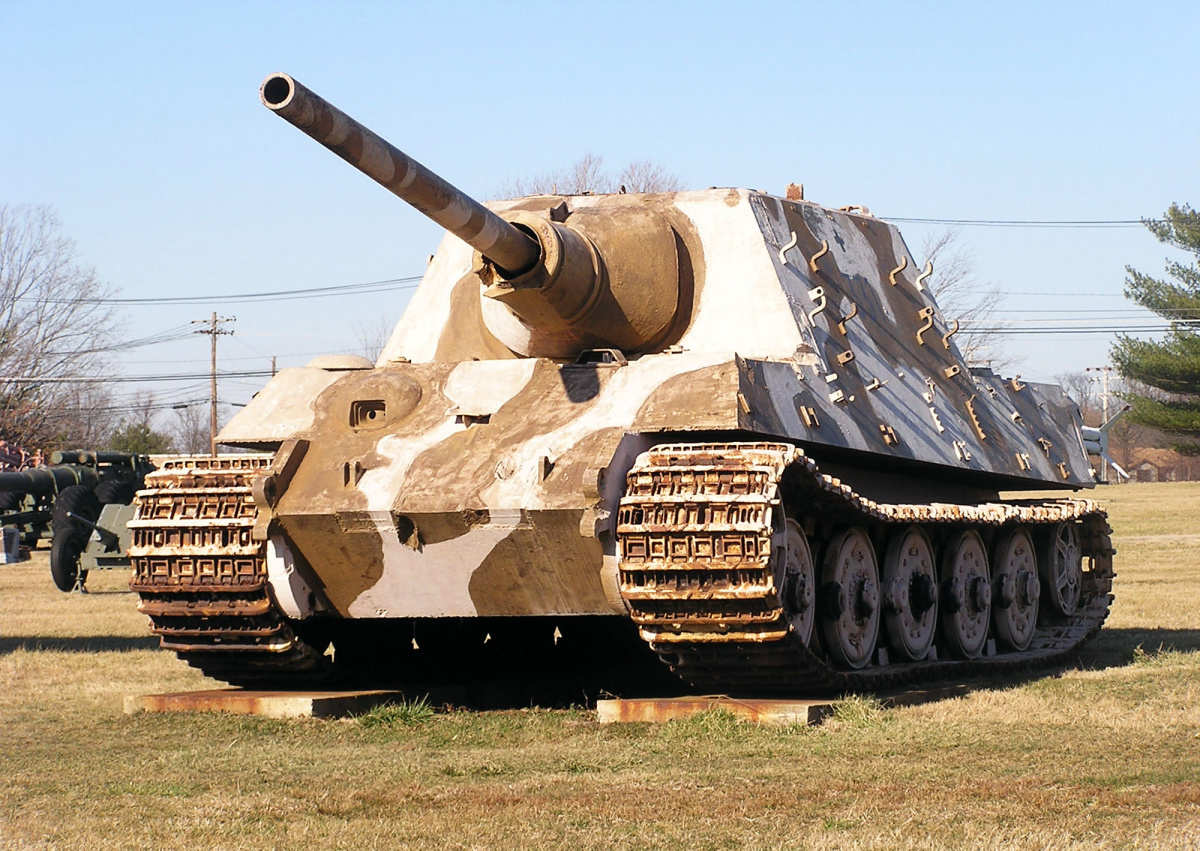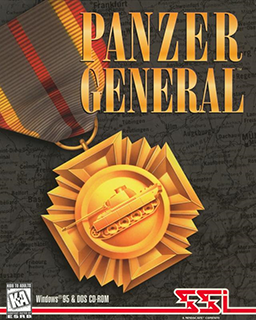
Posted on 04/07/2018 9:25:29 AM PDT by Simon Green

To some minds, bigger is always better—but size can create is many new problems as it solves. Midway through World War II, Nazi Germany decided to take its huge 128-millimeter antiaircraft gun and stick it on its biggest, baddest tank. The result was the monstrous Jagdtiger (“Hunting Tiger”), then heaviest tank to see action in World War II—and still heavier than modern M1 Abrams and Leopard 2 tanks! But the vehicle’s terrifying bulk proved to be its own worst enemy.
During World War II, German factories churned out numerous turretless assault guns (Sturmgeschutz) and tank destroyers (Jagdpanzers) based on each major tank chassis. Though the lack of a turret made them less capable in offensive operations, they were cheaper to build, could carry heavier guns and armor, and remained highly effective at ambushing enemy tanks or providing fire support. Therefore, a turretless version of the huge seventy-ton Tiger II tank was seen as a natural platform for the 128-millimeter gun. A full-scale wooden mockup of the Jagdtiger was presented to Hitler on October 20, 1943, and the führer enthusiastically approved production.
The Jagdtiger was nearly eleven meters long and three meters tall, and tipped the scales at seventy-nine short tons—or eighty-three fully loaded with ammunition and a crew of six. Much of that weight went into 250 millimeters of armor protection in the casemate superstructure housing the main gun; however, the lower hull had only fifteen centimeters, and the sides and rear eight. Thus, while the front armor was practically invulnerable, it remained susceptible to shots to the side, rear and top.
The gargantuan vehicle retained the same 690-horsepower Maybach HL 230 P30 used on the Panther tank—even though the Jagdtiger was 60 percent heavier. Theoretically capable of going twenty-one miles per hour, the “moving bunker” was reduced to nine miles per hour cross-country, and its fuel-gulping characteristics limited range to fifty to seventy-five miles. The motor simply lacked adequate power, and predictably broke down with alarming frequency.
The 128-millimeter Pak 44 gun measured fifty-five calibers and had only ten degrees traverse to either side. Its sixty-pound shells traveled at 950 meters a second, with a range of up to fifteen miles if used for indirect fire. The forty rounds of two-piece ammunition had to be assembled by two loaders before each shot, and the gun had to be leveled to evacuate the breech. The Jagdtiger also mounted a machine gun in the hull, and sometimes a second antiaircraft machine gun on the rear engine deck. Tiger ace Otto Carius was not thrilled with this “secret weapon that could still save Germany,” as described in his autobiography Tigers in the Mud:
“Any large traversing of the cannon had to be effected by movement of the entire vehicle. Because of that, transmissions and steering differentials were soon out of order. . . . A better idea for the travel lock of the eight-meter long cannon of our ‘Hunting Tiger’ was also necessary. It had to be removed from outside during contact with the enemy. Locking down the barrel during a road march was necessary, of course. Otherwise the mountain brackets would have been worn out too quickly and exact aiming would have been impossible. . . . We discovered that the cannon, because of its enormous length, was battered about so much as a result of even a short move off the road that its alignment no longer agreed with that of the optics.”
The Jagdtiger was intended to “snipe” enemy tanks from two or three miles away while remaining immune to return fire. This was a fine concept, but Germany already had the Pak 43, a smaller seventy-one-caliber, eighty-eight-millimeter gun that could still penetrate the heaviest Allied tanks such as the Churchill VII and IS-2. This was already deployed on the Jagdpanther, a fifty-ton tank destroyer with superior mobility and still formidable armor protection.
The Pak 44 had roughly the same maximum penetration as the Pak 43, though admittedly its heavier shells retained greater energy for long-distance shots. However, even standard German seventy-five-millimeter guns were highly effective versus the most numerous Allied tank types, the American M4 Sherman and Russian T-34. Despite its niche advantages, the Pak 44 was a classic case of overkill.
I am assuming that Carius wrote "Montagehalterungen" (but am unable to find "Tiger im Schlamm" in order to verify my supposition).
Regards,
German armor is consistently overrated. The Soviets had superior, and simpler concepts. American and British quality was superior. What made German panzers so lethal for so long was superior doctrine and superior personnel.
Mounting brackets.
There was no point in a Jagdtiger when they had Jagdpanther.
I think the 88mm PAK was good enough to kill anything that appeared during the war, including the Pershing and IS tanks.
Yep. They probably would have done best concentrating resources on Panzer Mk-IV production and improvements.
Ther was no point in any of their heavy tanks including Panther which by allied standards was a heavy tank.
Yes the Tiger may have been invulnerable from the front but when you never have more than 30-40 operational Tigers along a +1,000 miles front, they become useless... even resource liabilities in the larger scheme of the conflict.
Based on the Tiger II hull. Tankers much preferred the Tiger II and found it much more useful.
Germans didn't have nearly enough tanks and wasted too many hulls of good vehicles on assault guns.

The also liked their railroad guns. There was an analysis on the resources that went into them, and what those resources could have been used for - aka X battalions of tanks that were much more usefully mobile for the type of war being waged.
There is a clone of Panzer General on Ipad called Open Panzer.
Sweet, thank you for the tip. I’ll have to check it out.
That’s what Allied tankers all thought.....NOT!
Germans lost a production battle. But tank to tank, the Tiger, Tiger 2, and Panther were more than match for any allied tank. Too complicated in design I’ll agree. Too call them overrated doesn’t square with performance tank to tank like at Kursk.
Somewhat akin to the old Soviet Azeri 2S3 or newer MSTA-S.
The Serman and Panzers started out with 75 mm cannons. The Germans fired a high-velocity shell because their barrels were longer.
Slower rounds from the Sherman bounced off the Panzers.
I believe the designers for the Sherman made the barrel shorter because the tank had to be shipped overseas and they didn’t want the barrel to stick out beyond the front of the vehicle. This made the gun useless and many Allied tankers died for the sake of convenience.
Yes and no. By 1943, the Germans were on the run and out of the assault business. However, in a defensive role firing from ambush, the Stugs with their low profile and powerful gun gave a good accounting of themselves. Using imitation as the best form of flattery, the Stug concept can be considered successful in that the Soviets and Americans developed similar assault gun platforms. Below is the American WW-II developed T-28:

The “bigger is better” for German tanks was only useful on the eastern front where you had open fields to hit the enemy before they could return fire and you had room to navigate. When they tried using the larger tanks on the western front, they no longer had the advantage over the smaller more nimble allied tanks as they could no longer pick them off before they themselves were also in range of fire as well as not being able to maneuver away from the overwhelming numbers of lighter tanks that still had enough fire power to cripple or destroy them.
The Panther tank was almost the perfect tank for Germany, if they had only utilized a transmission design similar to the bolted on v-gear transmission like the Sherman tank. Panther’s could damage their straight gear transmission at higher speeds which required factory repair rather than field repair - keeping it off the battlefield.
Dunno.
The Mark IV was getting a little long in the tooth and the Mark III was obsolete for anything but an assault gun chassis.
A simplified Panther and Jagdpanther might have been a good idea.
Problem was, the Panther the Germans built was larded up (which started out as a German T-34...) with gizmos inleaved road wheels and they couldn’t build them fast enough.
Tigers, though, were a waste of production lines and steel.
Disclaimer: Opinions posted on Free Republic are those of the individual posters and do not necessarily represent the opinion of Free Republic or its management. All materials posted herein are protected by copyright law and the exemption for fair use of copyrighted works.